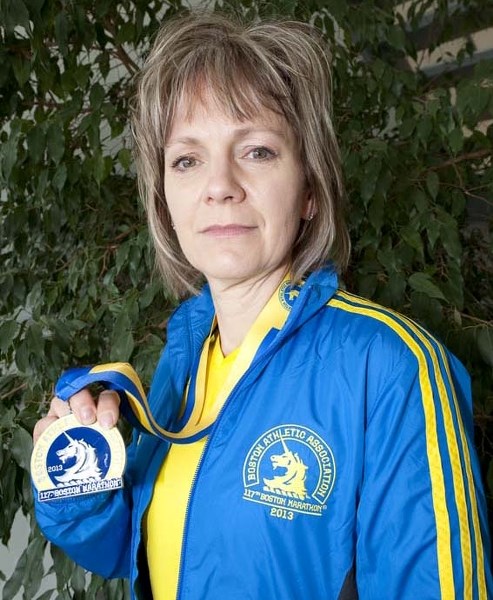April 15 was a perfect day for a marathon in Boston, say local runners: clear skies, a cool breeze and hundreds of thousands of cheering fans. It was also a day when two bombs detonated at the finish line of the Boston Marathon, killing three and injuring about 170. Four St. Albert athletes were in the marathon at the time, reports the marathon's website.
April 15 was a perfect day for a marathon in Boston, say local runners: clear skies, a cool breeze and hundreds of thousands of cheering fans.
It was also a day when two bombs detonated at the finish line of the Boston Marathon, killing three and injuring about 170. Four St. Albert athletes were in the marathon at the time, reports the marathon's website.
It was like there were two halves to that day, says Cary Prins, a St. Albert marathoner who finished the race just prior to the explosions – a great race and a terrible tragedy. "It was a day like no other."
Prins was about four blocks away picking up his street clothes when the bombs went off, and says he didn't hear or see any sign of them.
He saw an emergency response vehicle zip past, but didn't realize what had happened until he tried to get lunch 10 minutes later. "The news began pouring out," he says, and everyone was glued to the TV. Text messages from concerned friends flooded his phone. "It was like a 9/11 incident."
He struggled to believe that this had just happened at the race he had just finished. "That was really surreal."
It was likely a little more real to Bernie Stasiuk. A St. Albert resident, he was about a block ahead of the finish line on Boylston Street when the first bomb went off at about 2:50 p.m. local time. Hearing it, he turned around to see the second one explode a few buildings closer to him.
"I saw the blast come right out," Bernie says. "All you could see was smoke and dust." The packed crowd started to panic, and the cops were shouting for everyone to "move" and "get away."
"I just thought that I better go try and find Colleen."
Colleen Stasiuk, Bernie's wife, was still in the marathon and just a kilometre away from the blast site. She heard what she thought was a cannon going off in celebration of Patriot's Day, and noticed that a lot of her fellow runners seemed busy with their cellphones. "I never would have thought that it was a bomb."
Then she saw Bernie run out of the crowd to intercept her. "He took me off the course and told me that the race is cancelled, there's been a bombing, you cannot get your finishing medal."
She probably would have been much closer to the explosion had she not been limping from an old injury, she notes. "My running injury saved me."
Great start, horrific end
The Boston Marathon is the world's oldest annual marathon. First held in 1897, it now draws top athletes from around the world and is a major fundraiser for charities.
Carolyn Donnelly, a psychologist from St. Albert, was one of the 23,336 people at the starting line Monday. A long-time marathoner, she had trained for months to qualify for the event.
Race organizers used a huge convoy of busses to move everyone to the start line in Hopkinton, Mass., Donnelly says.
It was amazing, she recalls. "Before we even got to the start line, the sides of the road were filled with spectators all clapping and cheering."
Hundreds of thousands of people were out watching the marathon, Prins says, and they never stopped cheering. "It's like being in a rock concert for 26 miles."
Runners start the race in waves of several hundred at a time. "There were so many footsteps that it sounded like rain," Donnelly says.
Since everyone's a pretty good runner, Prins says, you pretty much spend the whole race as part of one big running mob.
The fans were about 15 rows deep at the finish, Donnelly says, which she reached after about three hours and 49 minutes – about 11 minutes faster than her personal best.
She was about a block past the finish line picking up her participation medal when she heard a big boom behind her. "You could feel it in your chest," she says. "I turned around and I saw all this smoke and debris." A runner next to her wondered if a generator had blown.
The second explosion followed moments later, Donnelly says. "I knew it wasn't good at that point." Volunteers told everyone to swiftly leave the area. "There was just sirens everywhere. That's when I knew this was very serious."
Donnelly and the Stasiuks say they returned to their hotels and watched the events unfold on the news. Everyone was helping each other, they noted, with neighbours handing out blankets and drinks to runners. Security officials grilled everyone about the bombs prior to the flight back home, Donnelly says.
People can survive traumatic events by reaching out to each other, Donnelly says, which is what she saw athletes and others doing in Boston. "This event just reminds us of how important that is."
Prins and Donnelly say they hope to be at next year's Boston Marathon. Colleen Stasiuk was less certain, citing her injury.
This event is wired into Boston's DNA, Prins says, and he expects he'll see just as many people out at next year's event. "It's just what they do."
